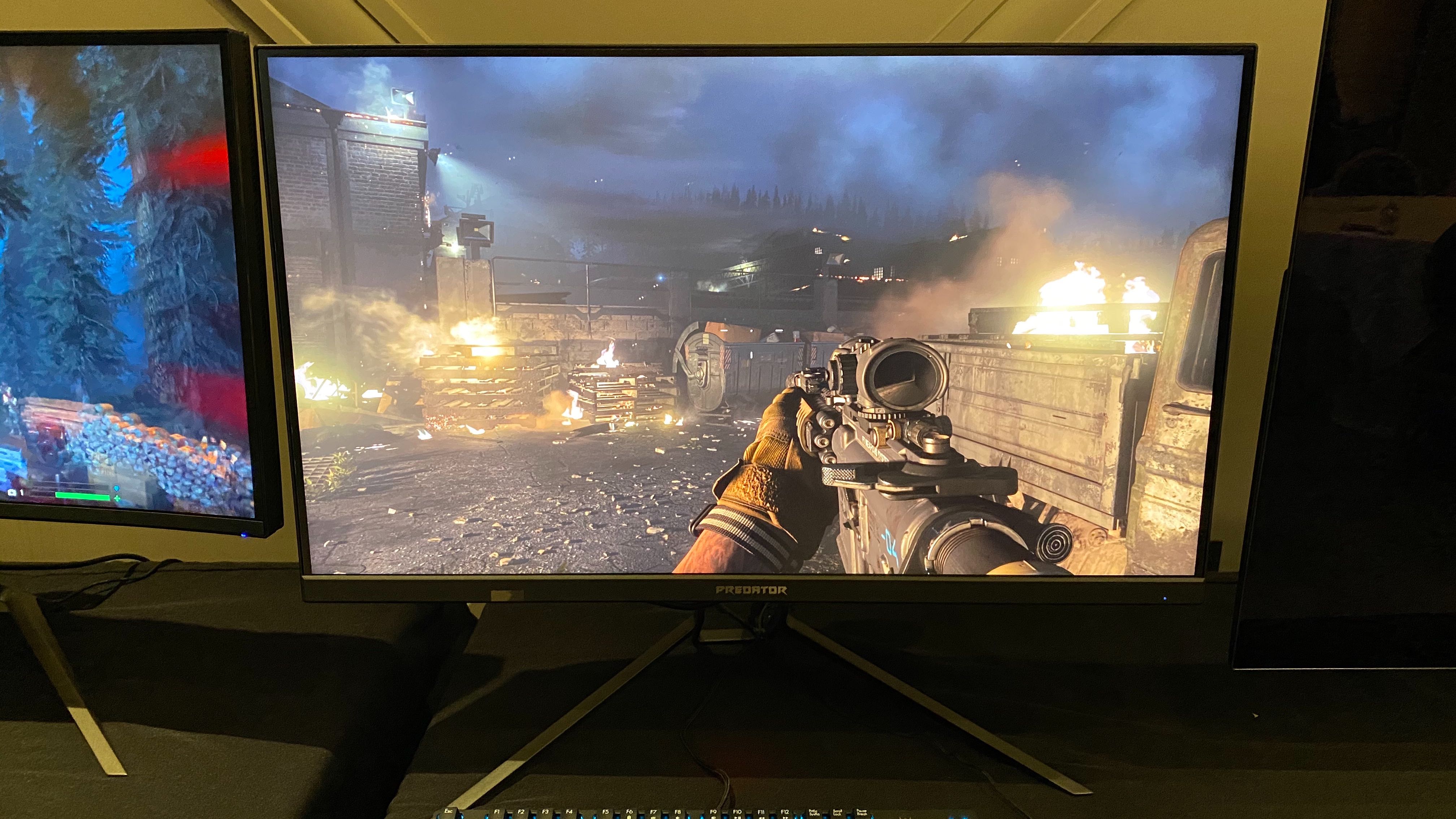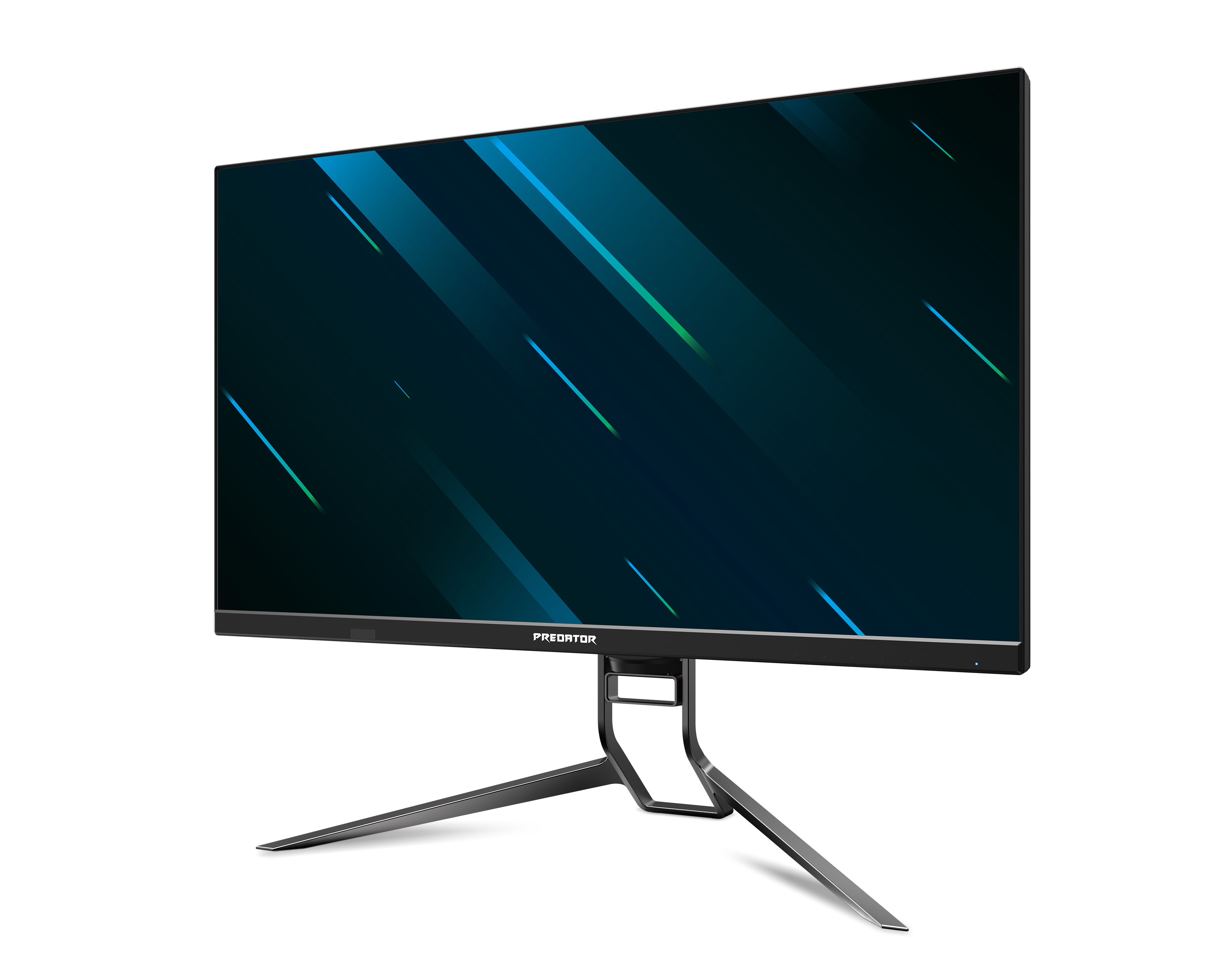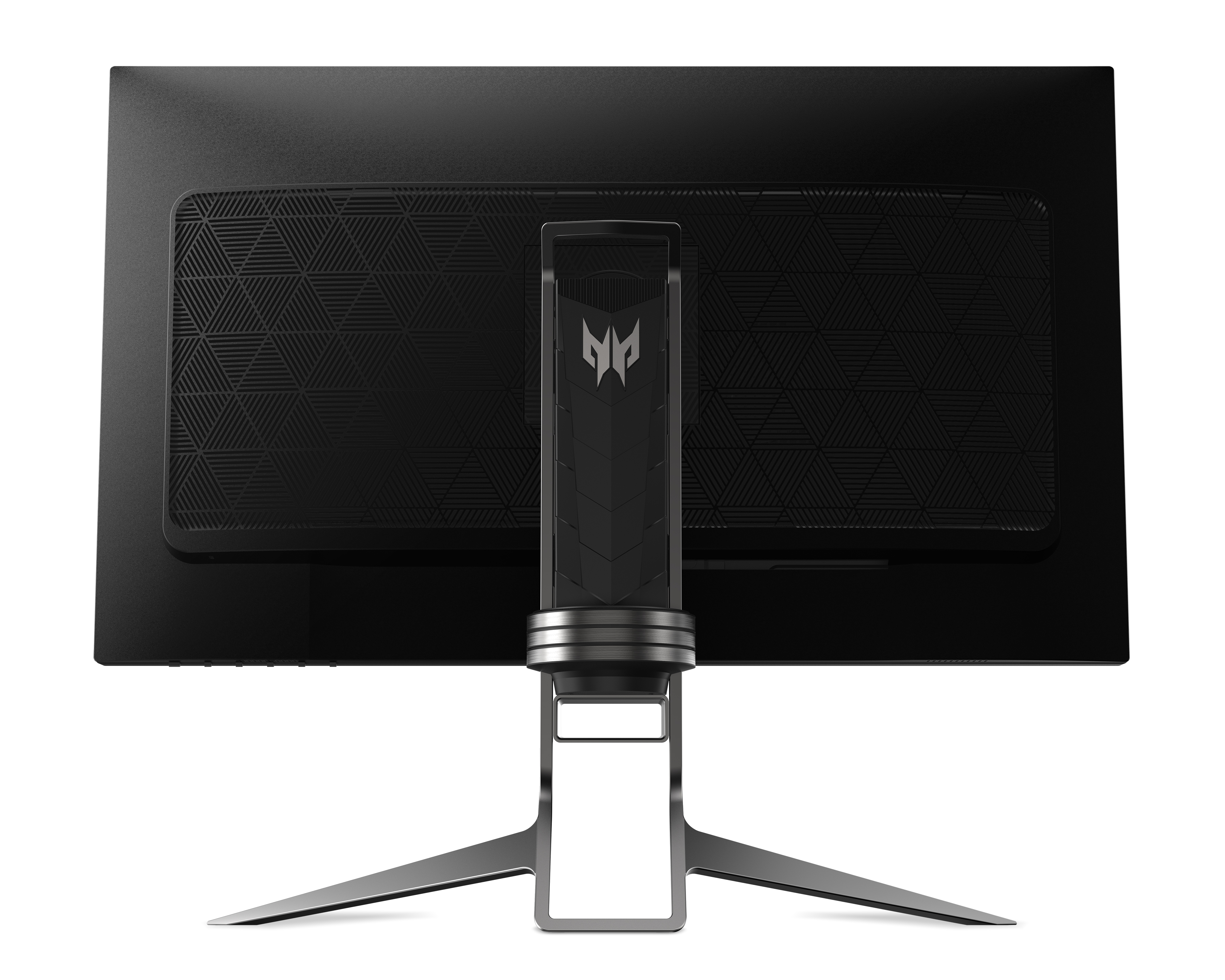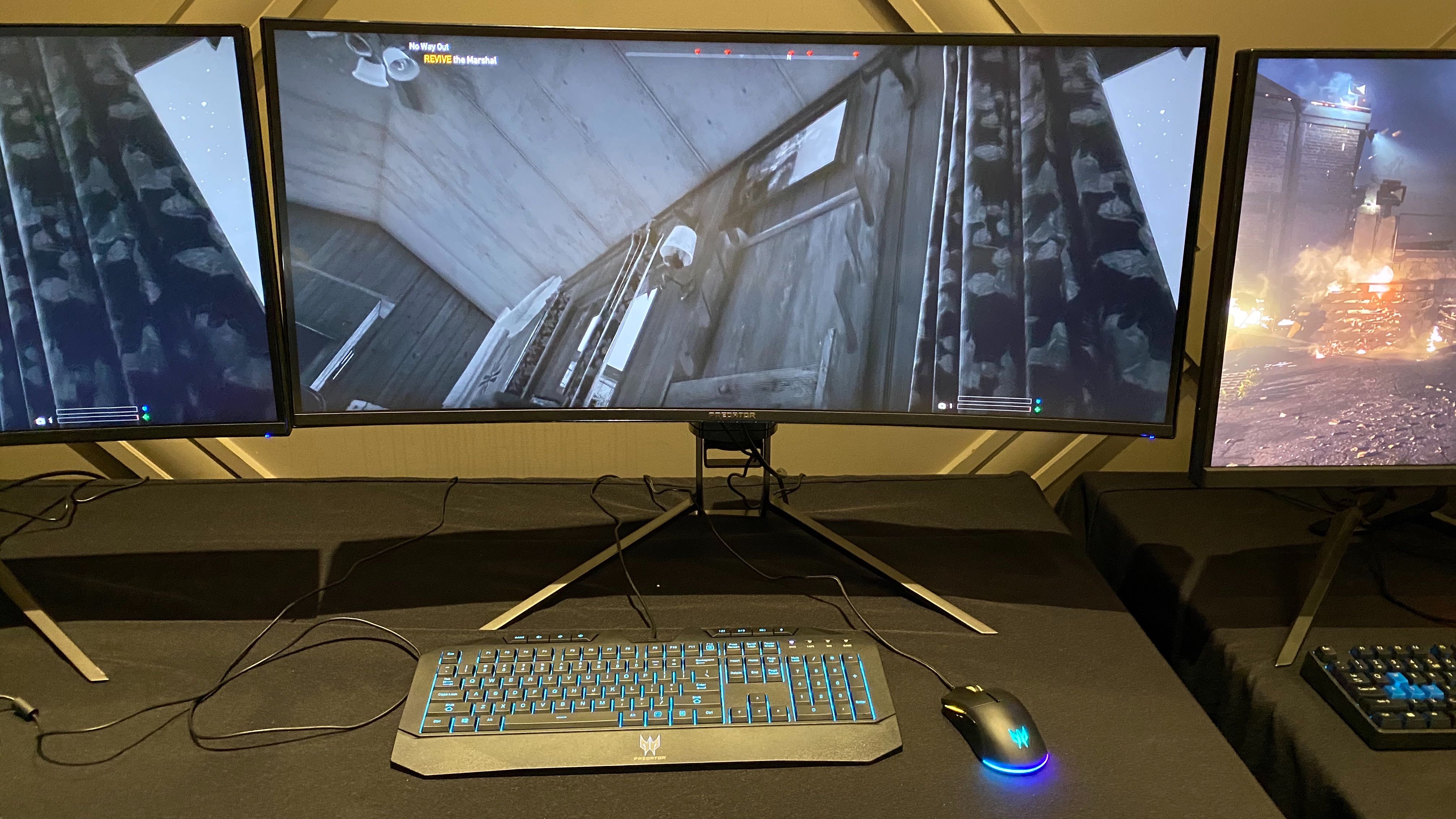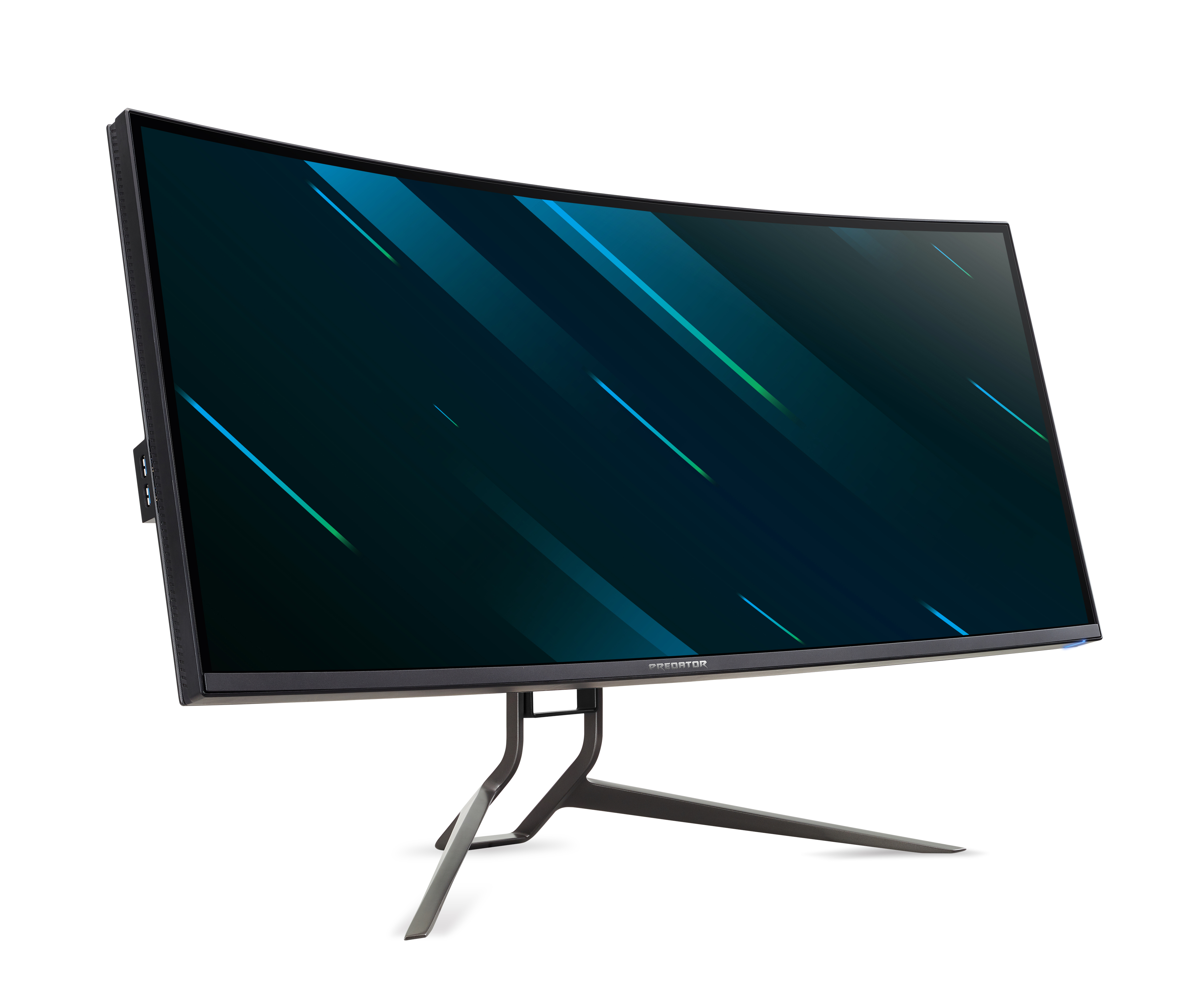Acer Predator X32 Mini-LED Gaming Monitor Hits a Radiant 1,400 Nits Brightness With HDR
With a mini-LED that bright, this should be the ultimate HDR monitor.
The ultimate HDR experience calls for a couple things. For one, you’ll want a super bright screen, and then there’s the experience afforded by a full-array local dimming (FALD) backlight that allows the monitor to display differing levels of brightness in different zones. The Acer Predator X32, a 32-inch 4K gaming monitor arriving in Q1, will bring all that and then some. It could be the second mini-LED PC monitor available and one of just two monitors certified to deliver HDR content at at least 1,400 nits brightness. That luminescence comes at a cost though: the Predator X32 will cost $3,599.
What really makes the Predator X32 is its mini-LED backlight. While that tech is still a step below microLED and another one below OLED (Acer also announced an OLED gaming monitor today), mini-LED is superior to typical LED monitors because its LED diodes are about half as small, allow vendors to fit more of them. The only mini-LED monitor currently available is the Asus ProArt PA32UCX, a professional-grade monitor that’s $4,000 at the time of writing.
The Predator X32 has 1,152 local dimming zones, just like the ProArt PA32UCX. For comparison, the HP Omen X 65 Emperium, Asus ROG Swift PG27UQ and Acer Predator X27 are some of the most powerful LED monitors around, thanks to FALD, and they each have only 384 zones.
The Predator X32 is also the second monitor to be announced as earning the DisplayHDR 1400 certification VESA launched in September. That means its guaranteed to hit at least 1,400 nits brightness with HDR content. It’s VESA’s brightest DisplayHDR certification, and only one other monitor has earned the title as of this writing, the upcoming Asus ProArt PA32UCG (no price or release date yet).
For those seeking the best 4K gaming monitor, the Predator X32 boasts a 144Hz refresh rate and supports Nvidia G-Sync Ultimate.
But while part of Acer’s Predator gaming line, it’s clear the Predator X35 also has a place in professional creatives’ homes. In addition to its min-LED backlight, it covers 89.5% of the very wide Rec. 2020 gamut for strong 4K colors. The 10-bit panel also covers 99% of the AdobeRGB gamut and is said to have a Delta E of less than 1. Ultimately, this is also a high-end display for video creation.
Acer Predator X38
For those seeking something slightly more attainable, Acer also announced the Predator X38 today. It’s a 37.5-inch ultrawide curved (2300R) gaming monitor with 3840 x 1600 resolution, DisplayHDR 400 certification, G-Sync and a 175Hz overclocked refresh rate with a 1ms (GTG) reponse time with overdrive. It’ll cost $2,400 when it debuts in April.
Get Tom's Hardware's best news and in-depth reviews, straight to your inbox.
Also keeping in mind the 55-inch Predator CG552K OLED monitor also announced today ($2,999), Acer has secured a place on the shortlist of gamers seeking the most premium display in 2020.
Specs
| Row 0 - Cell 0 | Acer Predator X32 | Asus ProArt PA32UCX | Acer Predator X38 |
| Panel Type / Backlight | Not disclosed / Mini-LED, 1,152 dimming zones | AHVA-IPS / Mini-LED, 1,152 dimming zones | Not disclosed / LED, curved (2300R) |
| Screen Size | 32 inches | 32 inches | 37.5 inches |
| Max Resolution & Refresh Rate | 3840 x 2160 @ 144Hz | 3840 x 2160 @ 60Hz | 3840 x 1600; 175Hz with overclock |
| Response Time (GTG) | Not disclosed | 5ms | 1ms with overdrive |
| HDR Brightness | 1,400 nits | 1,200 nits | 400 nits |
| Contrast | Not disclosed | 1,000:1 | Not disclosed |
| Speakers | 2x 4W | 2x 3W | 2x 7W |
| Ports | DisplayPort 1.4; 3x HDMI 2.0; 4x USB 3.0 | DisplayPort 1.2; 3x HDMI 2.0; 4x USB 3.0; 2x Thunderbolt 3 (USB-c); 3.5mm headphone jack | DisplayPort 1.4; HDMI 2.0; 4x USB 3.0 |
| Price (as of Writing) | $3,599 | $4,000 | $2,399 |
| Availability | Q2 2020 | Available now | April 2020 |

Scharon Harding has over a decade of experience reporting on technology with a special affinity for gaming peripherals (especially monitors), laptops, and virtual reality. Previously, she covered business technology, including hardware, software, cyber security, cloud, and other IT happenings, at Channelnomics, with bylines at CRN UK.
-
AlistairAB See this is what we were waiting for. 32 inches with a FALD backlight, 120+ Hz. And the price $3599? Ridiculous. Anyone still want to defend LCD technology? LG can easily make 32 inch OLED monitors for $999 or less with all the HDR support and better in every way. Seems like FALD and mini LED is a dead end tech. It can't be adapted to HDR properly.Reply -
spongiemaster Reply
Permanent screen burn in makes OLED a non starter for a computer monitor. That's why no one is producing any. Current OLED monitors are just large format TV screens advertised for PC use. How many plasma computer monitors were there despite vastly superior picture quality compared to LCD's of that era? Same problem.AlistairAB said:See this is what we were waiting for. 32 inches with a FALD backlight, 120+ Hz. And the price $3599? Ridiculous. Anyone still want to defend LCD technology? LG can easily make 32 inch OLED monitors for $999 or less with all the HDR support and better in every way. Seems like FALD and mini LED is a dead end tech. It can't be adapted to HDR properly.
There is actually a smaller OLED monitor from Asus, released earlier this year.
Only $4000 for 21.6"
That's not the future. -
AlistairAB Replyspongiemaster said:Permanent screen burn in makes OLED a non starter for a computer monitor. That's why no one is producing any. Current OLED monitors are just large format TV screens advertised for PC use. How many plasma computer monitors were there despite vastly superior picture quality compared to LCD's of that era? Same problem.
There is actually a smaller OLED monitor from Asus, released earlier this year.
Only $4000 for 21.6"
That's not the future.
That's a garbage JOLED OLED. That company is more like a tax credit company rather than actually making anything. Many people such as myself have been using LG OLED TVs as monitors for some time with no burn in problems. There is no monitor version because it takes a large factory and there is nowhere to produce it yet. There's some hope now that the LG Chinese factory will come to full production over the next few months. 48 inch model is supposed to be coming. -
spongiemaster Reply
It seems no one in the industry agrees with you. Where are the screens? Anything even announced?AlistairAB said:That's a garbage JOLED OLED. That company is more like a tax credit company rather than actually making anything. Many people such as myself have been using LG OLED TVs as monitors for some time with no burn in problems. There is no monitor version because it takes a large factory and there is nowhere to produce it yet. There's some hope now that the LG Chinese factory will come to full production over the next few months. 48 inch model is supposed to be coming. -
AlistairAB Replyspongiemaster said:It seems no one in the industry agrees with you. Where are the screens? Anything even announced?
Buy a 48" OLED for around 1 grand rather than buy a 32 inch mini led for 4 grand... buy 3 and replace them if they get burn in still cheaper... -
shadragon An email from Acer just confirmed this monitor will not be available in the near future with no ETA on delivery. I've waited 7 months and this monitor has not appeared on the market anywhere that I can see. Not even sure if review samples were shipped.Reply
I've owned the last two generations of Predators, but now I'm looking at other vendors offerings. Crappier stats, but at least I can buy them now.
Toms Hardware, there's a story here. Other manufacturers have put out new kit. Why can't Acer??? -
hotaru.hino Reply
Because these are stepping stones to microLEDs. And if microLEDs are all that are cracked up to be on top of being manufactured on economic scales that make sense, then OLEDs aren't going to look as pleasing anymore.AlistairAB said:Seems like FALD and mini LED is a dead end tech. It can't be adapted to HDR properly.
Also on the flip side, I don't have room on my desk for a 48" TV and it makes zero sense anyway given the typical viewing distance I'm at from my current setup.
